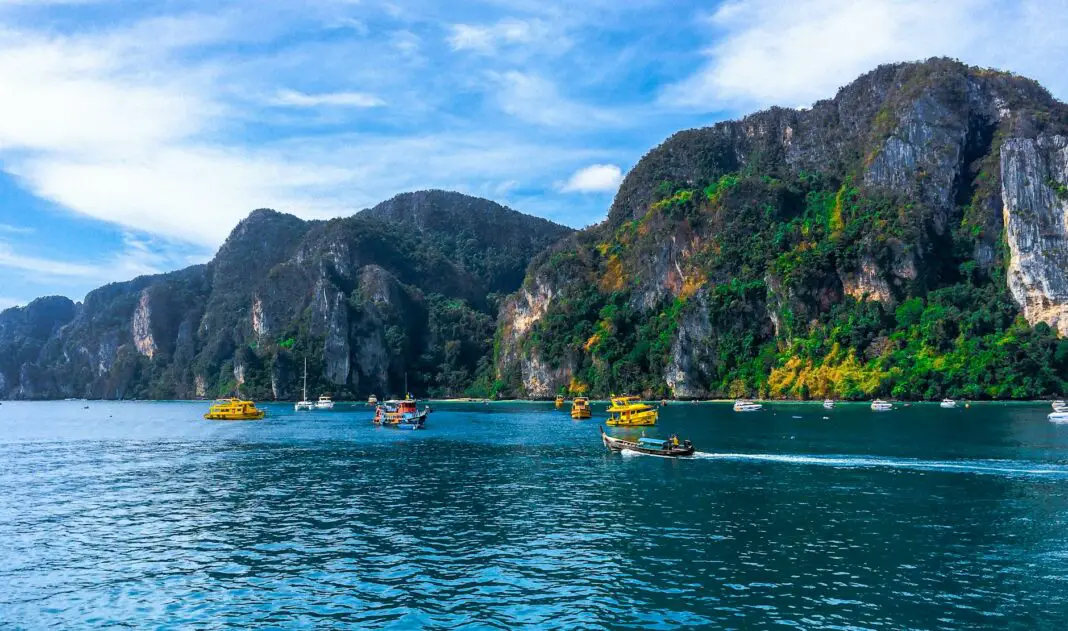**A Journey to Thailand’s Marine Wonders: Is Conservation the Key to Ocean Revival?**
Embarking on a trip to Thailand offers an enchanting escape into tropical paradise, rich with culture, stunning landscapes, and vibrant marine life. As travelers flock to this Southeast Asian gem, a significant concern arises: the sustainability of its marine ecosystems. With the impact of tourism and climate change becoming increasingly evident, the question must be asked—is Thailand’s marine conservation the secret to ocean revival? This blog dives deep into the interplay of tourism, conservation efforts, and the future of Thailand’s oceans, providing a vibrant narrative that reflects both challenges and triumphs.
Explore the breathtaking underwater landscapes of Thailand while uncovering the dedicated efforts to restore and nurture these precious marine resources. As we unveil the myriad of programs and initiatives aimed at ocean conservation, you’ll gain insights into how they lead to a more sustainable tourism economy that not only benefits local communities but also the health of the oceans. Join us as we journey through this compelling narrative of revival, resilience, and responsibility.
**Table of Contents**
– **The Allure of Thailand’s Marine Ecosystems**
– **The Impact of Tourism on Marine Life**
– **Conservation Efforts: A Glimpse into Progress**
– **Local Communities: Champions of Conservation**
– **The Role of Technology in Marine Preservation**
– **Impacts of Climate Change and Adaptation Strategies**
– **Actionable Insights and Responsible Travel Tips**
– **Thriving Oceans: A Positive Outlook on the Future**
– **Your Next Adventure: Engaging with Conservation**
– **Frequently Asked Questions**
**The Allure of Thailand’s Marine Ecosystems**
Thailand’s marine ecosystems are often regarded as some of the most biodiverse and visually stunning in the world. From the mesmerizing coral reefs of the Andaman Sea to the teeming sea life of the Gulf of Thailand, exciting snorkeling and diving opportunities await anyone inclined to explore the deep blue. Colorful fish dart in and out of coral structures, while majestic sea turtles glide through these crystalline waters, painting a vivid picture of marine beauty that beckons adventurers and nature enthusiasts alike.
However, as tourism continues to rise, the fragility of these ecosystems becomes increasingly apparent. Biodiversity is at risk, with various species threatened by overfishing and habitat destruction. To ensure that these natural wonders remain pristine for future generations, it is imperative that both travelers and the tourism industry adopt practices that prioritize environmental sustainability and marine preservation. Embracing eco-friendly travel choices not only benefits the environment but enhances the travel experience by connecting visitors with the intrinsic beauty and value of these ecosystems.
**The Impact of Tourism on Marine Life**
Tourism significantly influences the delicate balance of Thailand’s marine environments, offering both economic opportunities and challenges to sustainability. The industry serves as a lifeblood for local communities, generating revenue and providing jobs—from tour guides to restaurant owners. Nevertheless, the increasing number of tourists engaging in water-based activities like diving, snorkeling, and boat tours can lead to harmful consequences for marine life.
Overcrowding in popular tourist spots stresses marine ecosystems, resulting in coral damage, pollution, and disturbances to wildlife habitats. Additionally, the rise of unregulated fishing practices exacerbates these issues, threatening stock levels and disrupting the natural equilibrium. Consequently, raising awareness about responsible tourism behavior among travelers is paramount, ensuring that visitors understand their role in safeguarding the oceans while still enjoying the captivating beauty Thailand has to offer. With measures in place, we can strike a balance between enjoying these marine treasures and preserving them for the future.
**Conservation Efforts: A Glimpse into Progress**
To address these challenges, Thailand has made great strides in marine conservation efforts that signal hope for ocean revival. Various organizations and governmental initiatives have emerged, dedicating themselves to protecting marine biodiversity through sustainable practices. Noteworthy programs include marine protected areas that restrict fishing and tourism activities, while coral restoration projects utilize innovative techniques to regrow damaged reefs and habitats.
Community engagement is also at the forefront of these initiatives, empowering local populations to become active participants in conservation. Educational programs and workshops help raise awareness not only among tourists but also within local communities about the importance of preserving marine ecosystems. By fostering collaboration between stakeholders, Thailand showcases a model of how coordinated efforts can lead to positive environmental changes, paving the way for a healthier future for its oceans.
**Local Communities: Champions of Conservation**
The backbone of Thailand’s marine conservation efforts lies in its local communities, who are often the first to witness declines in ocean health and biodiversity. Through their intimate relationship with the sea, these communities understand the direct link between a thriving ocean and sustainable livelihoods. Many local fishermen are now embracing eco-friendly practices, such as responsible fishing techniques and participating in conservation programs that emphasize the importance of preserving marine resources.
Community-led organizations have formed, harnessing traditional knowledge and modern ecotourism principles to create alternative income streams beyond overfishing. For instance, many communities now offer guided snorkeling or diving tours that educate visitors about marine life while simultaneously promoting conservation efforts. This empowerment fosters a sense of stewardship among locals, ensuring a collective effort towards marine revival that benefits both the ocean and the people who depend on it.
**The Role of Technology in Marine Preservation**
Today, technology plays a crucial role in supporting marine conservation initiatives, leading to significant advancements in understanding and protecting marine environments. Innovations such as drone surveillance allow for real-time monitoring of coral reefs and marine wildlife, providing vital data that informs conservation strategies. Satellite imagery offers insights into habitat changes and assists in identifying illegal fishing activity, promoting enforcement of marine protected areas more effectively.
Moreover, initiatives like citizen science projects encourage travelers and local communities to contribute to research and data collection, fostering a collective responsibility towards ocean health. These technological advancements are not just tools; they represent a shift in how we interact with our oceans and the growing recognition of our shared responsibility to safeguard marine ecosystems. In embracing these technologies, Thailand sets a precedent for how modern solutions can lead to meaningful change in marine conservation.
**Impacts of Climate Change and Adaptation Strategies**
Climate change poses a formidable threat to Thailand’s marine ecosystems, leading to rising sea temperatures, ocean acidification, and more frequent extreme weather events. Coral bleaching has become a grim reality, affecting not just marine biodiversity but also the livelihoods of those who rely on healthy oceans. Highlighting the urgency of addressing climate change, local communities are becoming increasingly aware of the need to adapt to these challenges through sustainable practices and resilience-building strategies.
Adaptation can take many forms, including the establishment of adaptive management practices that allow for timely responses to changing environmental conditions. For example, promoting the use of resilient coral species in restoration efforts ensures that rebuilds are more capable of surviving future climate stresses. By fostering a culture of adaptability and resilience, local communities become better equipped to face the impending challenges posed by climate change, transforming obstacles into opportunities for sustainable growth.
**Actionable Insights and Responsible Travel Tips**
When exploring Thailand’s rich marine environments, adopting responsible travel habits is essential in supporting conservation. First and foremost, choose eco-friendly tours that prioritize sustainability and education. Engaging with local operators who actively participate in conservation can amplify your positive impact on the community. Additionally, avoid single-use plastics while on your journey, as they significantly contribute to ocean pollution. Instead, bring reusable water bottles and containers to minimize waste.
Take time to educate yourself about the marine species you’ll encounter during your adventure. Understanding the ecological roles of different creatures can deepen your appreciation for the marine world and empower you to make better choices on your travels. Lastly, participate in beach clean-ups or conservation activities while visiting; these experiences not only give back to the environment but also foster lasting memories and connections with local communities. By making conscious decisions, your travels can become an integral part of ocean revival.
**Thriving Oceans: A Positive Outlook on the Future**
Despite the challenges that lie ahead, Thailand’s commitment to marine conservation showcases a promising path forward. As local communities, government agencies, and international organizations continue to collaborate, innovative solutions emerge that blend environmental stewardship with socioeconomic development. Through education, advocacy, and community engagement, the tides are turning towards a future where healthy oceans can once again flourish.
With travelers increasingly leaning towards eco-conscious choices, the demand for sustainable tourism practices creates a unique opportunity to promote marine conservation programs. This positive shift not only preserves marine biodiversity but also enriches the travel experience, connecting visitors to the authentic beauty and vibrant cultures of Thailand. Embracing this hopeful narrative ensures the revival of Thailand’s oceans is not just a dream, but a shared reality that can be realized.
**Your Next Adventure: Engaging with Conservation**
As you plan your next adventure to Thailand, consider exploring how to contribute to marine conservation initiatives. Engage with local organizations that focus on ocean health, and look for volunteer opportunities or eco-tours that prioritize sustainability. Dedicating time to learning about Thailand’s unique marine ecosystems and supporting conservation efforts not only enriches your travel experience but also becomes a part of your legacy as a responsible traveler.
Traveling with purpose enhances the joy of exploring this beautiful country while making a tangible difference in preserving its invaluable marine resources. Together, as advocates for sustainable tourism, we can help foster a thriving future for Thailand’s oceans.
**Frequently Asked Questions**
**What are the best times to visit Thailand for marine wildlife?**
The optimal period for witnessing marine wildlife in Thailand typically spans from November to April. During these months, conditions are perfect for snorkeling and diving.
**How can tourists contribute to marine conservation efforts?**
Tourists can have a positive impact by participating in eco-friendly tours, avoiding single-use plastics, and supporting local conservation programs during their travels.
**What specific marine conservation programs exist in Thailand?**
Thailand boasts numerous initiatives, including the establishment of marine protected areas, coral reefs restoration projects, and community education programs aimed at fostering sustainability.
**Is it safe to swim and snorkel in Thailand?**
Generally, it is safe to swim and snorkel in Thailand’s waters, but it is advisable to check local advisories for conditions and potential hazards.
**How has climate change affected Thailand’s marine ecosystems?**
Climate change has led to coral bleaching, changing marine species distributions, and increased frequency of extreme weather events, presenting significant challenges to ocean health in Thailand.
Image Credit: Pexels





